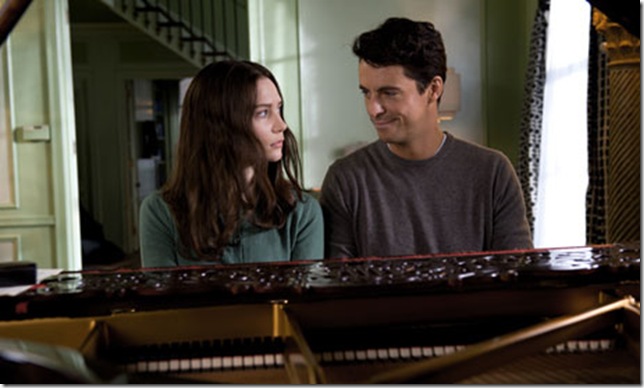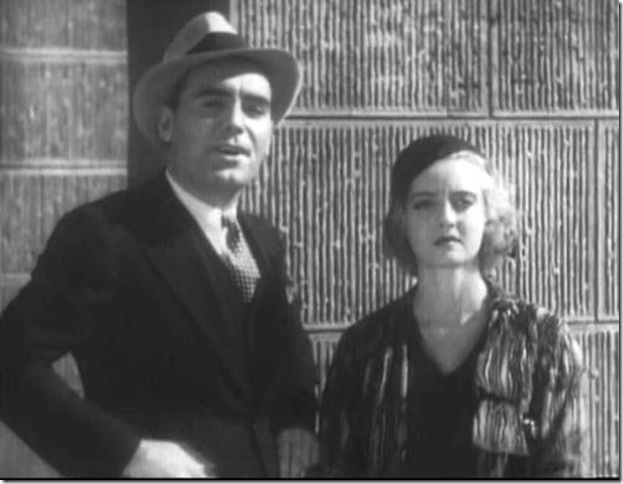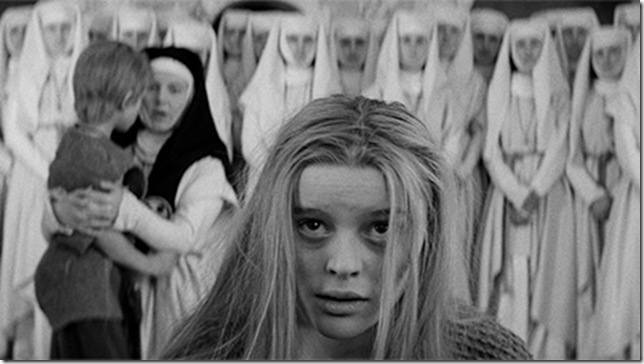For an Asian crime thriller, a continental genre rich with tough guys who know their way around firearms, it’s refreshing to watch a hero who is chaste, square and can’t throw a punch, let alone handle a gun. This is the case with Young-Jak (Kang-woo Kim), the errand-boy and unwitting protagonist of The Taste of Money (IFC, $22.48 DVD), the latest cult film from South Korea’s Im Sang-soo (director of 2010’s acclaimed The Housemaid). The film captures the fall of a dynastic Korean family, whose three generations are toppled by infidelity, embezzlement scams and revenge fantasies wrought to life. Young-Jak navigates this environment of sharks with a clear-eyed moral compass, refusing even to acquiesce to the flirtatious advances of the empire’s comely daughter Na-Mi (Hyo-jin Kim), until he can no longer ignore the sin boiling ever so quickly around him.
The Taste of Money is not as erotic as its marketing suggests, and its story is difficult to follow. Set mostly in the family’s heavily surveilled, crystalline manse — more prison than pleasure palace — the film begins at a glacial pace, weighed down by talky and convoluted scenes of trilingual business dealings. The whole thing could have been 30 minutes shorter, but it’s worth your patience, thanks to some of the gonzo surrealist elements that creep like termites into the film’s classical gangster-saga structure; I can count on a full hand the set-pieces you won’t soon forget. And it’s nice to follow a main character who is less aspirationally glamorous and more reflective of the way most of us really are.
Hitchcockian in its stylized classicism, Park Chan-Wook’s Stoker (Fox, $17.99 Blu-ray, $14.99 DVD) recasts Shadow of a Doubt in a sexually subversive 21st century disturbia. After her father dies, 18-year-old India (Mia WasIkowska, pale as Wednesday Addams visiting a morgue), is visited by Charlie (a vacant-eyed Matthew Goode), an uncle she never had who harbors twisted fantasies and dark secrets. Her mom, a porcelain, whispery Nicole Kidman, falls under Charlie’s charms, and it looks like only India will decipher the truth about her uncle — but what she does with that truth is this movie’s trump card.
The screenplay, by Wentworth Miller, could have been less heavy-handed, but at least it’s of a piece with the film’s consistent unreality, situated more in movie lore than the natural world. There’s an unforgettable play on the Psycho shower scene and intoxicating editing montages that conjure Brian de Palma, himself a Hitchcock devotee. Some of the film’s memory-fueled fade transitions are some of the best I’ve seen, including a visual drift from a close-up of Kidman’s red hair to a jumble of tall grass in the woods. Expressionistic and exhilarating, Stoker is a delirious, and rare, example of a Hollywood studio movie acquiescing to the crazy visions of a loopy Asian director, and it’s all the more effective for it.
The pre-code melodrama Hell’s House (Kino, Blu-ray, $23.42) is an underrated early example of Hollywood tackling the hard times and penurious desperation of Depression-era America, filled with blunt and brutal tragedies handled with quiet dignity. The movie opens on a mischievous boy — whose name happens to be James Mason (Junior Durkin) — watching his mother perish in his arms after being struck by a car. It only gets worse: Orphaned, the child moves in with his uncle, who has just been downsized, and who is also housing the shady bootlegger Matt Kelly (Pat O’Brien), a fast-talking sleazoid who has cultivated the false impression of a mover and shaker in the art and culture of the big city. It isn’t long before James unknowingly becomes an assistant to Matt’s liquor distribution business and is promptly punished for his featly to his degenerate boss, imprisoned in the fascist juvenile prison that gives the film its title.
From the torture of the corrections room to the delirium of solitary confinement, Hell’s House takes a sobering, documentary approach to the scenes in the wretched prison, and even if the other inmates often sound as delinquent as choirboys, the movie’s institutional rage reverberates loud and clear. A primitive exploration of the price of loyalty in more ways than one, Hell’s House is marketed as an early Bette Davis vehicle, which it is not — she’s only in a few scenes, though of course she leaves an impression. But it’s worth seeing anyway for its confrontational, of-the-moment themes.
If Tal and Naim, the two characters at the center of A Bottle in the Gaza Sea (Film Movement, $19.99) had Facebook accounts, their relationship statuses would definitely be “It’s complicated.” For one, there’s a Capulet-and-Montague fatalism to their long-distance coupling: Tal is a French Jew living in Israel, and Naim is a Palestinian in Gaza. Following a bombing in a Jerusalem café (shades of the recently released film The Attack), Tal sends an anonymous peace letter in a bottle to any Palestinian on the other side of the divide who finds it. Naim and his militant friends do, and he writes Tal back, at first just for kicks. Gradually they form a bond that transcends their national conflict, but it will be tested when the latest round of bombings and retaliations touches both of their lives and families.
In one of her letters to Naim, Tal elucidates the film’s politically correct thesis: “I think both sides are to blame. Over here and over there, there are some who want peace and some who don’t.” Like much of A Bottle in the Gaza Sea, this line sounds like something from an adolescent’s term paper; it’s not refutable, but it’s also bland and simplistic, and hampered by its intent to be as objective as possible about the strife. The movie makes some potent points about the envies some Palestinians have of their democratically progressive enemies, and it continues to boggle the mind that such hatred and destruction can percolate over a distance of just 73 kilometers. But this sentimental exploration of a perennial art-cinema topic is only fractionally as effective as it should be.
And finally, I gave the old college try to 1967’s Marketa Lazarova (Criterion, $31.96 Blu-ray, $26.96 DVD), but I admit to giving up about halfway through its two hours and 45 minutes, dumbstruck by the film’s impenetrable density. Considered to be the greatest Czech film of all time in its native land, director Frantisek Vlacil’s adaptation of Vladislav Vancura’s allegedly unfilmable novel is itself divided into chapters, but even the chapter descriptions are difficult to follow. A poetic rendering of a blood feud between 13th-century pagans and Christians, Marketa Lazarova showcases buckets of bold technique, with sudden zooms, freeze frames, lofty tracking shots and a soundtrack of cathedral chants supplementing the epic narrative.
Great care and precision obviously went into every shot, with the result hugging a strange border between Akira Kurosawa’s widescreen kineticism and Andrei Tarkovsky’s mysterious portent. It didn’t work for me; whatever emotional connection Vlacil intended was definitely lost in both style and translation, stimulating the brain but eschewing the heart and soul. If Marketa Lazarova is a masterpiece — and it may very well be — it’s a perpetually frustrating one. Criterion’s release is a feast for the film’s followers, however, with bonus interviews with actors and the costume designer, a short documentary about the director and his process, a featurette about the film’s impeccable restoration and other generous supplements.




